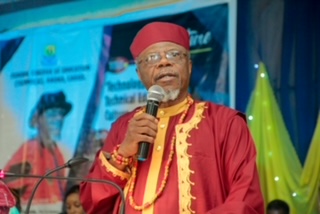By Toyin Falola
Contrary to popular belief, our universities can’t solve all society’s problems or even teach about them. Every society contains many knowledge centres—domestic, public, private, industrial, etc. We belong to the higher education cluster, and we cannot perform the tasks allocated to other sectors, such as primary and secondary. Sometimes we inherit issues that should have been corrected earlier, such as language, ethics, and civic responsibilities. However, this does not absolve them of the responsibilities of bettering society. Therefore, the best way for our universities to start teaching society’s most pressing problems is by first determining the important problems to society. Knowing this will help to focus on dealing with each identified pressing problem.
As a powerful institution, the university must begin to push for some changes on its own while also teaching about the problems and changes in the societies. The people with the most connections, knowledge, access and skills reside in the university community, and we need to use all these resources to drive change. How far have we been able to tap these resources to influence the changes we want to see in the country? Are our universities taking the drivers’ seat or just waiting for things to fall into place?
Our universities need to begin to establish a deep connection with other institutions of the societies. For instance, they need to connect to the workplace, religious centres, and, more importantly, early education providers, who are important because they set the foundation for each student before going into a university system. If they get it wrong, the university will have difficulty producing excellent graduates. And since we know better in the universities, we should connect with these important institutions. If our universities can connect with them, they can work out how the training that students receive in their early stages is instrumental to their subsequent growth and development at the universities.
Importantly, we need to rejuvenate our curriculum. We have long maintained a curriculum that has lost touch with the realities of our present world. It is possible that if you line up universities graduates from the last twenty years, they will all testify to learning the same thing in the same way and with the same limitations. We must rise above this and respond to our curriculum’s terrifying knowledge and skill lacuna.
However, when drawing up a curriculum, we should not mistake assembling people who alone have been in the system. While their experience and input are valuable, I believe we can be more encompassing in drawing our curriculum by including top inputs from employers, key stakeholders, and policymakers. Having all these people contribute to the curriculum will give it a boost, but it will also make it solid and more relevant.
Our universities are referred to as research and development centres, which means that from a distant and close look, the university has an unending obligation to drive research and development for academic or educational upliftment and to proffer solutions to society’s core problems. In meeting the demands of society, I cannot stress enough the importance of community service. Many universities in Nigeria have put different community service programs around them, but we still have to look deeper. The goal is not merely to establish these community programmes; we also need to investigate whether such are achieving their intended purposes.
Particularly, we need to ask how the community service has been able to lift people out of some of their most terrifying situations? How many people have we served in ways that have transformed their lives in their years of establishment? How has community service granted access to people on the street? We should not just talk about the gown and the town; we need to ensure that the contributions of the gown are lifting the town in ways that we have not experienced before.
Universities should go beyond imparting textbook knowledge to students to teaching them about real-life experiences. Students should be able to learn about their future workplace, how it operates, and how to manage themselves in it. They should be made to understand labour market trends and how they are supposed to prepare to meet its ever-expanding demands. Universities can also create work-integrated learning opportunities so that students get unhindered opportunities to experience what obtains out there.
The demand for routine is fast disappearing and being replaced by machines. This means that based on the present operational curriculum in our universities, graduates may be unable to meet the demands of the future workplace and most likely become unemployable. In response, our universities can train students for a world that demands more soft skills. Thus, beyond what we presently experience in our universities, we can begin to incorporate lifelong lessons and skills in our curriculum so that graduates can meet the demands of the twenty-first-century workplace.
Cultural learning is part of the soft skills of the future that robots cannot replicate because it teaches young people the culture and values of the environment. This will contribute to their success in any job as it gives them cultural sensitivity, people management skills, communication capacities beyond just the language of their disciplines, and so on. Universities must be designed to accommodate students’ peculiarities. It must be designed so that students can find happiness, purpose, value, and knowledge in it. The university should no longer be a centre for rote learning. It needs to be a place where everyone comes in and goes out fulfilled. Happy university graduates make up happy societies.
*Being a presentation by Prof Falola at the 6th Biennial Conference of Committee of Pro-Chancellors of State-Owned Universities in Nigeria, at Osun State University, March 21-25, 2022


